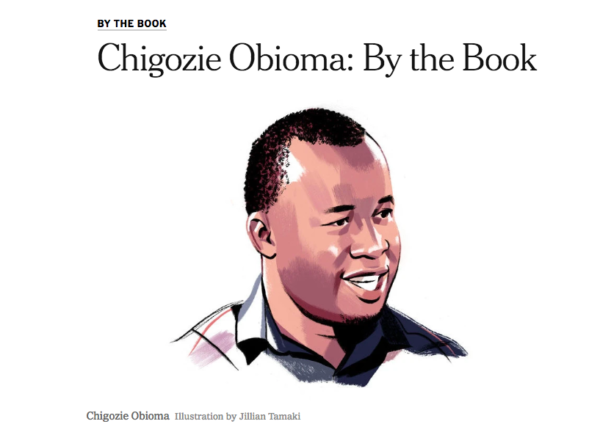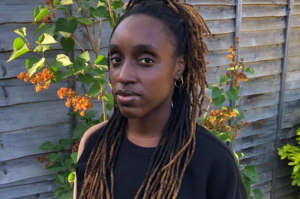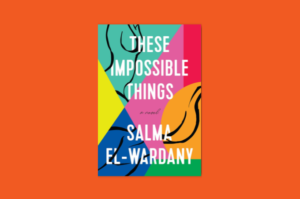 Congratulations to Chigozie Obioma! His second novel An Orchestra of Minorities was published yesterday.
Congratulations to Chigozie Obioma! His second novel An Orchestra of Minorities was published yesterday.
Sometime last month, Obioma had shared a deeply personal essay on his journey as a reader. Read here if you missed it.
A few days ago, he was featured on the high profile interview series run by the New York Times. “By the Book” is a weekly interview forum that allows authors to open up about their lives as readers. It is one of the most coveted platforms for writers, featuring literary luminaries like Teju Cole, Alice Walker, Barbara Kingsolver, Roxanne Gay, John Grisham, Michelle Obama, and others.
If you’ve ever wondered what kinds of things Obioma loves to read, what moves him as a reader, or what he reads or tries to avoid reading while he is working on a book, here is your chance to find out. All of Obioma’s responses are articulate and insightful, but there are few things worth highlighting.
For example, when asked: What moves you most in a work of literature? He answers:
Language. When a sentence jumps all of the rhetorical hurdles that life and our saturated minds place along the way to reach sublimity, I become moved to near tears. Consider this paragraph from Arundhati Roy’s novel “The God of Small Things”: “Being with Chacko made Margaret Kochamma feel as though her soul had escaped from the narrow confines of her island country into the vast, extravagant spaces of his. He made her feel as though the world belonged to them — as though it lay before them like an opened frog on a dissecting table, begging to be examined.” I call this audacious prose, and celebrate it enthusiastically.
Another resonant moment is when he gives a shout out to Oyinkan Braithewaite’s My Sister, the Serial Killer. When asked: Which genres do you especially enjoy reading? And which do you avoid?
My people say that a poor maid does not reject the embrace of a wealthy prince because of bad breath. I’m hardly turned off by considerations of genre or type. So I have found even manuals — of how to hunt wild birds in West Africa — fascinating. That said, if one returns to a well again and again and finds only bad-tasting water, it is difficult to keep returning there. This is why I tend to avoid works of fiction in which plot isn’t a function of character but the reverse, in which a set of events is orchestrated and characters are thrown in as fillers. I have this sense of the Dan Brown books especially. So I tend to avoid “upmarket crime thrillers.” Although, a few pages in, I’m liking “My Sister, the Serial Killer,” by Oyinkan Braithwaite.
Kudos to Obioma for using his access to such a big platform to amplify the work of other African writers.
When asked “What do you read when you’re working on a book? And what kind of reading do you avoid while writing?,” his response is telling.
It really depends. While working on “An Orchestra of Minorities,” I read a few books on Igbo cosmology simply to augment my knowledge of the cosmology and better recreate it in my fiction. But I sometimes find myself rereading works by great writers whose prose I envy. A slim census would include Vladimir Nabokov, Toni Morrison, Alan Paton, Arundhati Roy and Elizabeth Bowen, among others.
What I don’t read while working on a book is any book that remotely resembles what I’m working on. I had to read George Saunders’s “Lincoln in the Bardo,” for instance, for a class I was teaching, and halfway through I wished I hadn’t included it in the list because the transient state of spirits and the liminality of some of the characters marginally resembles my new book.
Curious about how he organizes his books?
My work space is disorderly. I have books on the floor, even though my original intent was to designate one shelf for purchased books and a separate shelf for books sent to me by publishers to endorse. I find everything mixed up, with copies of The New York Times poking out between stacks of galleys and issues of The Virginia Quarterly Review.
One of the hardest things to do is finding the right kind of book to give an author as a gift. But if you’re ever inclined to send Obioma a book gift, you might find his response to the question “What’s the best book you’ve ever received as a gift” helpful.
Khaled Hosseini’s “A Thousand Splendid Suns.” In 2008, I went from North Cyprus (where I was in college) to Mersin, Turkey, to spend the summer with a friend’s family, and they gave me a copy of the book. I found myself tearing into the riveting tale for the better part of the vacation.
Read the full interview here.









COMMENTS -
Reader Interactions